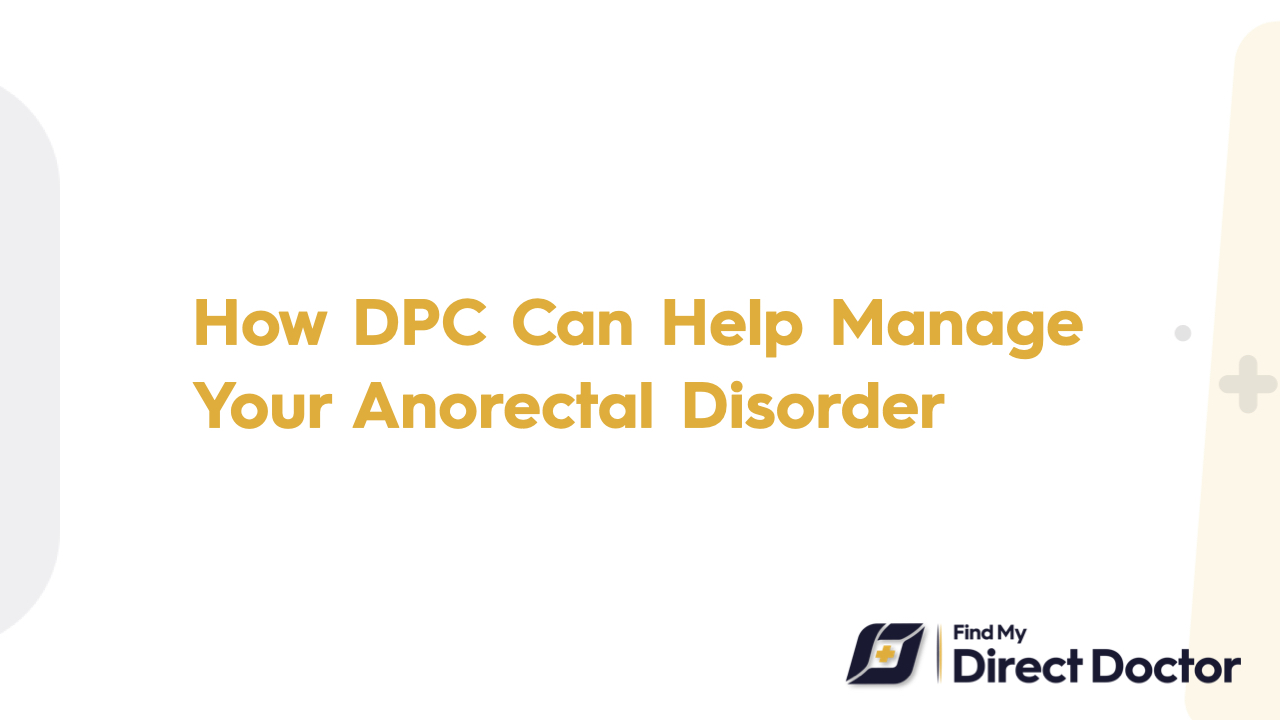Anorectal Disorders and Direct Primary Care (DPC): Discreet, Effective Relief
If you have suffered with hemorrhoids, anal fissures, or faecal incontinence, you understand how anorectal problems can interfere with daily activities. Affecting millions yearly, these disorders need knowledgeable, compassionate treatment. Direct Primary Care (DPC), however, presents a patient-centered approach to anorectal health by combining fast diagnosis, reasonably priced treatments, and techniques to restore comfort and confidence.

Comprehending Anorectal Problems
Typical disorders include:
- Hemorrhoids are swollen veins producing pain, itching, bleeding.
- Often from constipation, anal fissures are tears in the anal lining.
- Fecal incontinence is the absence of bowel control brought on by nerve/muscular damage.
Causes:
- Aging, childbirth, chronic constipation/diarrhea.
- Obesity; lazy lifestyle.
DPC's Transformational Effect Anorectal Management
Under the membership model known as Direct Primary Care (DPC), patients pay a monthly fee—usually 50 USD–150 USD—for unlimited access to their main care physician. For anorectal patients, this means no surprise bills, no waiting weeks for proctology consults, and treatment emphasizing your privacy and relief.
Here's why DPC distinguishes itself:
1. Early, In-Office Diagnosis
DPC doctors adhere to ACP guidelines including:
- Anoscopy: Visually seeing fissures or hemorrhoids on visits.
- DRE, digital rectal exams, evaluate sphincter tone.
- Lab tests: stool studies meant to rule out infections.
2. Reasonable, focused treatment
- By offering hydrocortisone suppositories at 10 USD instead of 50 USD+ retail, DPC clinics help to lower costs.
- Providing at wholesale rates bulk-forming laxatives (psyllium).
- Steering clear of ER visits by same-day telehealth consultations.
3. Ongoing Symptomatic Control
Patients with 24/7 access to your DPC doctor can:
- Change their laxative schedule or fiber intake.
- Control pain with nifedipine or topical lidocaine.
- Find guides for pelvic floor exercises for incontinence.
DPC Benefits for Anorectal Patients
Customized Treatment Plans
- Each visit, DPC doctors spend 30 to 60 minutes developing plans including:
- Sitz baths, rubber band ligation referrals, help with hemorrhoids.
- Botox injections and fissure healing from nitroglycerin ointment.
- Rehab for incontinence: coordination of biofeedback treatments.
Savings on Costs
- No co-pays for DREs or frequent follow-ups.
- Anoscopy in-office against specialist costs of 300 USD+.
- Early intervention helps one avoid surgery.
Whole Health Integration
DPC targets:
- Dietary counseling: hydration strategies with high fiber intake.
- Reducing abdominal pressure helps with weight control.
- Mental health: Shame/anxiety about symptoms.
Personal Success Stories from Real Life
- Case 1: Avoiding surgery, 35-year-old Sarah healed persistent fissures with DPC's nitro gel + fiber plan.
- Case 2: John, 60, used pelvic floor PT referrals from DPC to regain bowel control.
Questions: DPC and Anorectal Problems
- Q: Can DPC address thrombosed hemorrhoids?
- A: True. DPC either refers for ligation or does in-office drainage.
- Q: For chronic conditions, is DPC reasonably priced?
- A: Sure. On procedures and drugs, members save 50–70%.
- Q: Suppose I have to have a colonoscopy?
- A: A DPC works with gastroenterologists to coordinate cash-pay rates.
Why DPC Is a Win for Anorectal Patients: Reasons
First emphasis of the American College of Gastroenterology is conservative treatment. DPC presents this via:
- Spotting problems early on: stopping the advance to surgery.
- Empowering patients: Hygiene and bowel habits education.
- Costs should be simplified. One monthly cost covers all basic medical needs.
Recover Comfort Using DPC
Anorectal conditions do not have to rule your life. Every exam, every treatment, every step toward healing—every exam, every treatment, every partner you acquire with DPC respects your privacy, treats with expertise, and prioritizes your relief.






